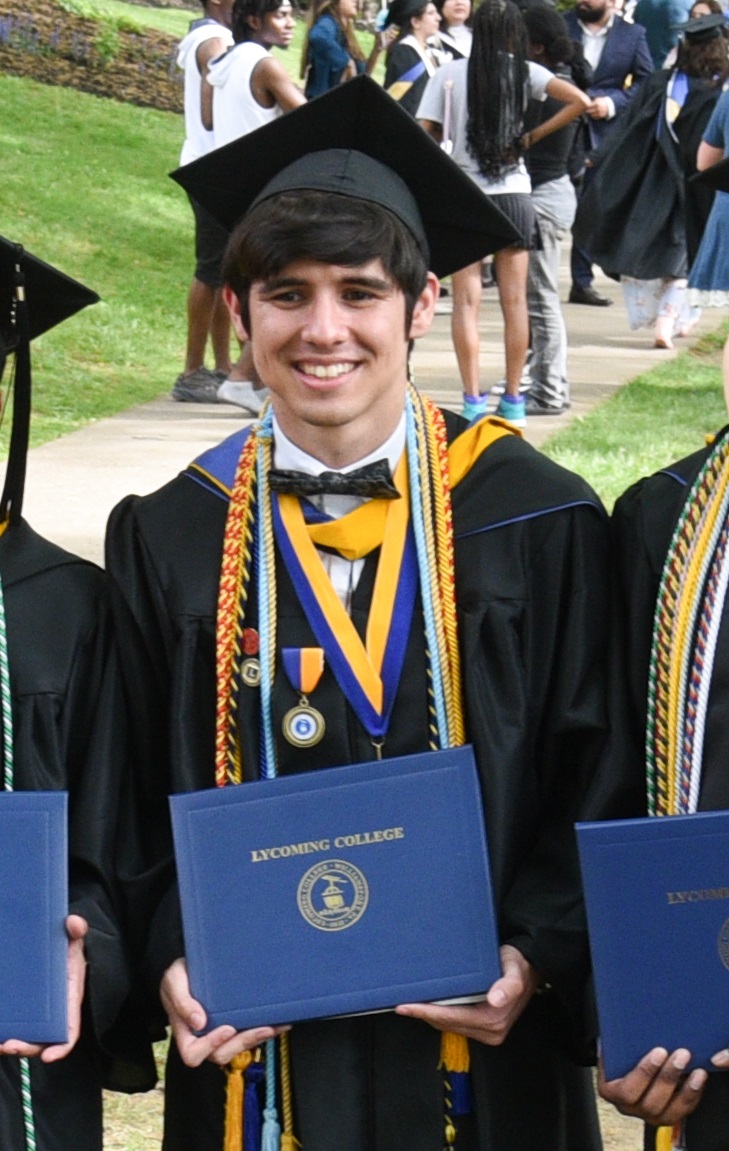
Download Image: Web
At the inaugural Lycoming College Undergraduate Humanities Research Conference, Spanish major and biology minor Jeovannee Castillo ’23 won the award for best research by a Lycoming College student for his paper, “The Cause and Cycle of Child Labor in Mexico.” Castillo’s presentation covered both his impressive research into the subject, as well as his own firsthand experiences having lived and worked as a youth in Mexico.
Born in California and raised in Pennsylvania, Castillo initially lived what he believed to be a perfect life. His family didn’t have much, but he and his two younger siblings were happy. All of that changed when he turned nine. During his family’s yearly trip to Mexico to visit their extended family, Castillo’s undocumented parents were captured by border patrol. Despite the fact that he and his siblings were documented American citizens, the entire family was eventually deported to Mexico.
Castillo and his family spent several months at the border, unsure of what to do and where to go. In the meantime, their landlord in America sold everything they had left behind, including all their possessions and vehicles, and pocketed the money. Eventually they moved to stay with Castillo’s grandparents, where the kids were enrolled in a local Mexican school.
According to Castillo, adjusting to Mexican school was the hardest part of living there. He described the education system as “abysmal” with instructors who were uninterested in teaching and a total lack of a culture of learning. To make matters worse, Castillo faced discrimination from other students for being “too American.” Even though he was one of the school’s top students, the stress and broken system were so much that he wanted to drop out after two years.
Then Castillo was given a choice; either continue school or drop out to work and save up money to return to the United States for his education. Castillo chose to leave school, and would spend the next several years working odd jobs. He worked in a tortilleria, a small shop that makes tortillas, sold ice cream out of a truck with his grandfather and candy in front of their house, and labored in avocado fields, which Castillo notes was the worst job, with harsh conditions and hours spent in the fields without much rest. After three years of saving, and with assistance from his family, Castillo had enough to travel back to America at the age of fifteen.
Once back in Pennsylvania, Castillo moved in with his cousin, and started attending high school. Yet again, Castillo faced discrimination and bullies, this time for being Mexican, but he also found a much richer education. Initially he was very shy, but he excelled at school once presented with teachers who cared about his learning. In his senior year, his English class was assigned a final paper about any topic they wanted, and Castillo chose his experiences being deported to Mexico.
He hoped to call attention to this under-discussed problem and analyze why it happened. He concluded that child labor worked like a sick cycle in Mexico, perpetuated by a lacking education system and economic necessity. Young people much like himself hated the poor school system, so they took the first chance they had to get out, which went hand-in-hand with the majority of families in rural Mexico in need of extra income in order to survive. These two circumstances feed into each other, making the discontinuation of the cycle an extremely difficult conundrum. He tied the paper together with research he’d done, his own experiences, and how he saw his siblings live like those statistics in Mexico. After reading his paper, Castillo’s teacher promised to help him get the college education he wanted, but never thought he would have.
Through the connections he made and his academic achievements, Castillo was accepted into Lycoming College with a full tuition scholarship. He said that once he came to Lycoming, he really felt like he found a community he belonged to. He spent his first three years here taking as many classes and joining as many clubs as he could, hoping to experience a little bit of everything. He dedicated his final year to preparation for grad school at Simmons University in Boston, Mass., where he’ll study to be a family nurse practitioner (FNP). However, he doesn’t look forward to leaving Lycoming.
“Looking back and cherishing all the moments I’ve had here is happy and sad at the same time,” said Castillo. "I never really knew what homesickness was until I got to Lycoming and had to leave. I could not be more grateful to have spent the best 4 years of my life surrounded by such amazing people at this amazing institution which has become my home."
After becoming an FNP, Castillo plans to have a permanent job in the United States, but will periodically make trips back to his community in Mexico to provide free medical care, hoping to help people who cannot afford to help themselves.